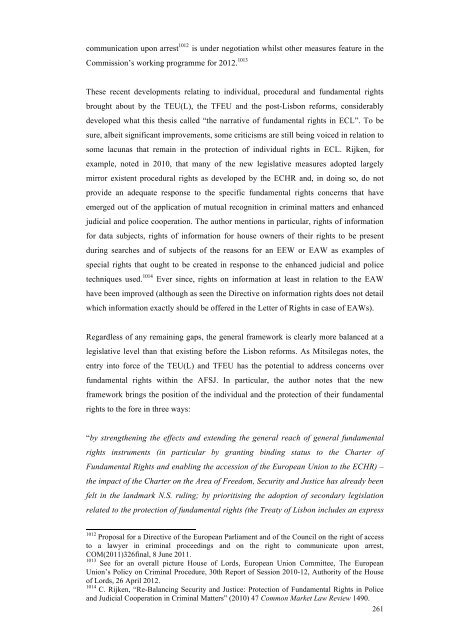The evolution of European Union criminal law (1957-2012)
The evolution of European Union criminal law (1957-2012)
The evolution of European Union criminal law (1957-2012)
You also want an ePaper? Increase the reach of your titles
YUMPU automatically turns print PDFs into web optimized ePapers that Google loves.
communication upon arrest 1012 is under negotiation whilst other measures feature in the<br />
Commission’s working programme for <strong>2012</strong>. 1013<br />
<strong>The</strong>se recent developments relating to individual, procedural and fundamental rights<br />
brought about by the TEU(L), the TFEU and the post-Lisbon reforms, considerably<br />
developed what this thesis called “the narrative <strong>of</strong> fundamental rights in ECL”. To be<br />
sure, albeit significant improvements, some criticisms are still being voiced in relation to<br />
some lacunas that remain in the protection <strong>of</strong> individual rights in ECL. Rijken, for<br />
example, noted in 2010, that many <strong>of</strong> the new legislative measures adopted largely<br />
mirror existent procedural rights as developed by the ECHR and, in doing so, do not<br />
provide an adequate response to the specific fundamental rights concerns that have<br />
emerged out <strong>of</strong> the application <strong>of</strong> mutual recognition in <strong>criminal</strong> matters and enhanced<br />
judicial and police cooperation. <strong>The</strong> author mentions in particular, rights <strong>of</strong> information<br />
for data subjects, rights <strong>of</strong> information for house owners <strong>of</strong> their rights to be present<br />
during searches and <strong>of</strong> subjects <strong>of</strong> the reasons for an EEW or EAW as examples <strong>of</strong><br />
special rights that ought to be created in response to the enhanced judicial and police<br />
techniques used. 1014 Ever since, rights on information at least in relation to the EAW<br />
have been improved (although as seen the Directive on information rights does not detail<br />
which information exactly should be <strong>of</strong>fered in the Letter <strong>of</strong> Rights in case <strong>of</strong> EAWs).<br />
Regardless <strong>of</strong> any remaining gaps, the general framework is clearly more balanced at a<br />
legislative level than that existing before the Lisbon reforms. As Mitsilegas notes, the<br />
entry into force <strong>of</strong> the TEU(L) and TFEU has the potential to address concerns over<br />
fundamental rights within the AFSJ. In particular, the author notes that the new<br />
framework brings the position <strong>of</strong> the individual and the protection <strong>of</strong> their fundamental<br />
rights to the fore in three ways:<br />
“by strengthening the effects and extending the general reach <strong>of</strong> general fundamental<br />
rights instruments (in particular by granting binding status to the Charter <strong>of</strong><br />
Fundamental Rights and enabling the accession <strong>of</strong> the <strong>European</strong> <strong>Union</strong> to the ECHR) –<br />
the impact <strong>of</strong> the Charter on the Area <strong>of</strong> Freedom, Security and Justice has already been<br />
felt in the landmark N.S. ruling; by prioritising the adoption <strong>of</strong> secondary legislation<br />
related to the protection <strong>of</strong> fundamental rights (the Treaty <strong>of</strong> Lisbon includes an express<br />
1012 Proposal for a Directive <strong>of</strong> the <strong>European</strong> Parliament and <strong>of</strong> the Council on the right <strong>of</strong> access<br />
to a <strong>law</strong>yer in <strong>criminal</strong> proceedings and on the right to communicate upon arrest,<br />
COM(2011)326final, 8 June 2011.<br />
1013 See for an overall picture House <strong>of</strong> Lords, <strong>European</strong> <strong>Union</strong> Committee, <strong>The</strong> <strong>European</strong><br />
<strong>Union</strong>’s Policy on Criminal Procedure, 30th Report <strong>of</strong> Session 2010-12, Authority <strong>of</strong> the House<br />
<strong>of</strong> Lords, 26 April <strong>2012</strong>.<br />
1014 C. Rijken, “Re-Balancing Security and Justice: Protection <strong>of</strong> Fundamental Rights in Police<br />
and Judicial Cooperation in Criminal Matters” (2010) 47 Common Market Law Review 1490.<br />
261
















